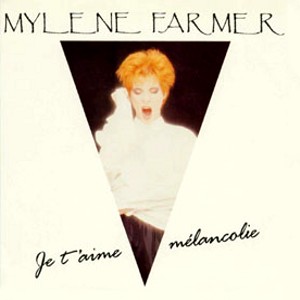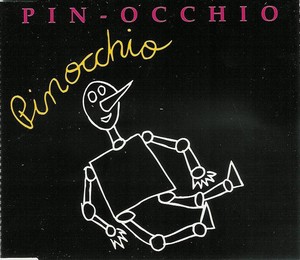
"Friend or Foe" is a song by Russian recording duo t.A.T.u., taken from the group's second English language studio album Dangerous and Moving (2005). The song was written by Dave Stewart and Martin Kierszenbaum, while production was handled by Kierszenbaum and Robert Orton. The song was released by Interscope on 2 October 2005 as the album's second single. Musically, the song is a pop rock and electropop inspired song, with dance music influences. The song features ambiguous lyrics; it is unclear who exactly the words are directed at.

"Désenchantée" is a 1991 song recorded by the French singer-songwriter Mylène Farmer. The first single from her third studio album L'Autre..., it was released on 18 March 1991 and achieved great success in France, topping the charts for more than two months. It was Farmer's most successful song and is generally considered her signature song.

"Twilight Zone" is a song recorded by the Dutch Eurodance band 2 Unlimited. It was the second single released in January 1992. The UK release of the single was the first 2 Unlimited single to include the vocals of Anita Doth as they had not been featured on their debut hit "Get Ready for This". However, Ray Slijngaard's raps were once again removed. The instrumental "Rave" version of the track sounds different from the original "Not Enough" version, with a more Hi-NRG style with more bass and added cowbells. The single scored chart success in many European countries and topped the chart in the Netherlands. Twilight Zone was the second single in a row to just miss out on the top spot in the UK again peaking at number 2. It was 2 Unlimited's biggest hit on the U.S. Dance chart reaching number 5.

"Living on Video" is a song by Canadian synth-pop band Trans-X written and published in 1982, but not released as a single until May 1983 by Polydor Records, and then remixed in 1985. It became a massive hit worldwide, with the remixed version peaking at #9 on the UK Singles Chart and #61 on the Billboard Hot 100. Trans-X also originally recorded a French-language version under the title "Vivre sur Vidéo". The song has been covered by many artists throughout the years.

"La Poupée qui fait non" is a 1966 song written by Franck Gérald (lyrics) and French singer/songwriter Michel Polnareff (music). It was recorded by Polnareff, becoming an immediate success in France and one of Polnareff most definitive songs. Jimmy Page played guitar on the recording. It also appeared as the last track in his album Love Me, Please Love Me.

"Je t'aime mélancolie" is a 1991 song recorded by the French artist Mylène Farmer. The song was released as the third single from her third studio album L'Autre..., in December 1991. Characterized by its gloomy lyrics and its music video shot on a boxing ring, it achieved success, becoming a top ten hit in France and Belgium.

"Fly Away" is a song by Trinidadian-German musician Haddaway. It was released on May 29, 1995 as the lead single from his second album, The Drive. The song was written by Dee Dee Halligan, Richard W. Palmer-James and Junior Torello, and produced by Halligan and Torello. As with several of Haddaway's singles, another CD maxi was commercialized a few months after the first release. The song was a number-one hit in Finland and reached the Top 10 in Denmark, Italy, the Netherlands and Switzerland.

"Got to Get It" is a song by the German group Culture Beat from their second studio album, Serenity. Written by Nosie Katzmann, Jay Supreme, Torsten Fenslau and Peter Zweier, the song was released as the second single from the Serenity album on 13 September 1993. It was a hit in many European countries, and reached number-one in Belgium and Finland. "Got to Get It" was also a top 5 hit in Denmark, Germany, Ireland, Italy, Spain, Sweden, the Netherlands and the United Kingdom. In both the US and Canada, the song peaked at number-one on the dance music charts.

"Anything" is a song recorded by the German eurodance band Culture Beat. It was released in December 1993 as the third single from their second album, Serenity. The single was very successful on the charts in Europe, reaching the Top 5 in at least nine countries, including Belgium, France, Germany, Spain and the United Kingdom.

"World in Your Hands" is a song recorded by the German eurodance band Culture Beat. It was released in March 1994 as the fourth single and the last one marketed in almost all countries in Europe from their second album, Serenity. As for other Culture Beat's singles, a CD maxi entirely composed of remixes was added among the available media a short time after. The song was a Top 10 hit in Finland and the Netherlands.

"Soirée disco" is a 1996 song recorded by the DJ Philippe Dhondt under the pseudonym of Boris. It was released as the first single from his eponymous debut album in the first weeks of January 1996. It achieved a great success in France and Belgium, topping their charts.

"Darla dirladada" is a traditional song, originating from the island of Kalymnos in Greece.

"Generation of Love" is a song recorded by German band Masterboy. It was released in June 1995 and is taken from their album of the same name. The female vocals are performed by Trixi Delgado. The song is one of the band's most successful singles in terms of peak positions on the charts. It achieved success in many European countries, particularly in Finland, where it peaked at number 6 and in France, where it peaked at number 8 and stayed on the chart (top-50) for 13 weeks. The song was also a hit in Austria and in Belgium (Wallonia), where it remained ranked in the top-40 for 18 weeks. On the Eurochart Hot 100, "Generation of Love" reached number 35. In 2006, it was re-released in a remixed version with Freedom Williams and Linda Rocco in featuring, but was much less successful. This version is included on Masterboy's 2006 studio album US-Album. The artwork of the remixes used the same picture, but with different colours.

"Stuck on You" is a song written by and originally recorded by Lionel Richie. It was the fourth single released from his second studio album Can't Slow Down released on May 1, 1984, by Motown, and achieved chart success, particularly in the U.S. and the UK, where it peaked at number three and number 12, respectively. "Stuck on You" reached number one on the Adult Contemporary chart, Richie's seventh chart topper. The song differs from Richie's other compositions, as it displays a country pop influence rather than R&B. The song marks Lionel Richie's country music debut, and indeed, "Stuck on You" peaked at number 24 on the country chart. As such, the single's cover photo shows Richie wearing a cowboy hat.

"Be My Baby" is a 1992 song recorded by French singer Vanessa Paradis. It was the first single from Paradis' eponymous third studio album and was released in September 1992. It was the singer's first single in the English language and was written by her companion at the time, Lenny Kravitz. It achieved great success in many countries, becoming a top-ten hit in Belgium, France, Germany, Ireland, the Netherlands and the United Kingdom. The CD maxi contains Paradis' first hit single as a bonus track, "Joe le taxi".
Pin-Occhio is an Italian electronic band composed of Nicola Savino and Marco Biondi. It had its peak of popularity in 1993 with two hit singles in Europe.

"Pinocchio" is a 1972 instrumental composed by Fiorenzo Carpi for the soundtrack of Luigi Comencini's miniseries The Adventures of Pinocchio. In 1993, it was covered by Eurodance music group Pin-Occhio. It also was covered by Pepeto at the same time as the original one and peaked at #21 in France. A massive hit was recorded in 2005 by Pinocchio, an animated character, under the title "T'es pas cap Pinocchio".

"Love Religion" is a song recorded by German dance act U96. It was released in October 1994 as the lead single from the album, Club Bizarre. Unlike U96's previous songs, "Love Religion" is more trance-oriented techno and pop. The background vocals are performed by Dutch singer, actress and TV host Daisy Dee. It peaked at number 2 in Finland and Sweden, and was also a Top 10 hit in Austria, Denmark, Germany, the Netherlands and Switzerland.

"Club Bizarre" is a song recorded by German dance act U96. It was released in February 1995 as the second single from the album of the same name. The song was a hit in several countries, although it was not as successful as U96's previous single, "Love Religion", but became a top twenty hit in the Netherlands, Sweden and Austria. On the Eurochart Hot 100, the single peaked at number 28 in April 1995. It features uncredited vocals by Skadi Lange.

"Land of Dreaming" is a song recorded by German band Masterboy. It was the third single from their album, Generation of Love. The song was released in January 1996 and features female vocals performed by Trixi Delgado. Several remixes were produced for the various formats, two of them were mixed by Italian Eurodance act Cappella. The song was a big success in Latín American countries Like Chile and México, but in Europe was unable to duplicate the same performances than Masterboy's previous hit singles. It reached its highest peak position in Germany where it was number 12 and charted for 17 weeks. It was also a top-20 hit in Switzerland, Finland and the Netherlands. In France, the song was ranked for ten weeks in the French top-50 Singles Chart and reached number 22. On the Eurochart Hot 100, "Land of Dreaming" peaked at number 42. In 2006, it was re-recorded in a remixed version with Freedom Williams and Linda Rocco in featuring and this version is included on Masterboy's 2006 studio album, US-Album.

















